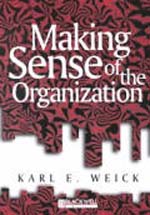 Making Sense of the Organization brings together under one cover a lifetime of spectacularly original work by one of business education’s leading organizational theorists. A compact summary of Karl E. Weick’s ideas is difficult to pull off. His view of the organization is hardly conventional. He likens the task of making sense of organizational life to figuring out the rules, processes, and outcomes of a rather unordinary soccer game:
Making Sense of the Organization brings together under one cover a lifetime of spectacularly original work by one of business education’s leading organizational theorists. A compact summary of Karl E. Weick’s ideas is difficult to pull off. His view of the organization is hardly conventional. He likens the task of making sense of organizational life to figuring out the rules, processes, and outcomes of a rather unordinary soccer game:
Imagine that you’re either the referee, coach, player, or spectator at an unconventional soccer match: the field for the game is round; there are several goals scattered haphazardly around the circular field; people can enter and leave the game whenever they want; they can say “that’s my goal” whenever they want to, as many times as they want to, and for as many goals as they want to; the entire game takes place on a sloped field; and the game is played as if it makes sense.
This is the universe for which Weick attempts to provide a cosmology. It's obviously not your average universe, and the cosmology he conjures up to explain it is far from orthodox fare. What counts as data in Weick’s world—firefighting crews dropping their tools as they flee from suddenly and unexpectedly out-of-control wildfires; airplanes colliding inexplicably while still taxiing on airport tarmacs; or jazz quartets improvising—is quite different from what we find almost anywhere else in the literature of organizational theory.
Among Weick’s most important and enduring ideas are the proposition that thinking about organizing as a dynamic process carries us further than thinking about organizations as static entities and the notion that small structures and processes tend to enlarge to produce large and often unanticipated consequences. He also notes that stable segments in organizations tend to be small and less common than we might like. Even hard-won moments of clarity, he adds, are often not stable or enduring: “No sooner do people make sense of the world,” he suggests, “than that sense is out of date.”
Sensemaking is often triggered, he notes, when events violate expectancies. Success and even survival hinge on people desperately trying to size up situations hurriedly in the hope of discovering just what they are dealing with, while simultaneously having to act on their hunches in the hope of forestalling further unraveling of the situation.
In Weick’s view, organizational realities are, for the most part, negotiated products. “When people engage in acts of sensemaking,” he asserts, “it is more precise to think of them as accomplishing reality rather than discovering it.” Sensemaking is seldom solitary, but, instead, is inherently social. Thus, people embedded in sensemaking predicaments must take others’ inputs (interpretations) and outputs (actions) into account at the same time they are desperately trying to make their own sense of a situation.
When encountering the body of Weick’s work arrayed together in one place, as it is in this book, one cannot help but be impressed with the profundity of his mind and the facility of its reach. Something else emerges as well: the sense of optimism that seems to pervade his view of the sensemaking process. Near the end of this book he suggests that perhaps it is even our duty to be optimistic. “To view optimism as a duty rather than as something tied to unsteady expectations of success,” he proposes, “is to position oneself in a sufficient variety of places with sufficient confidence that events may be set in motion that provide substance for that hope.”
Roderick M. Kramer is professor of organizational behavior at Stanford University Graduate School of Business. His review is excerpted from a longer review in Administrative Science Quarterly (December 2002) and reprinted here by permission.